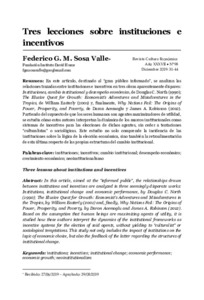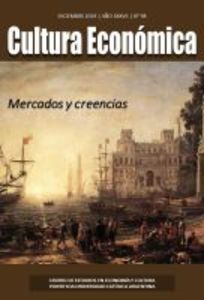Please use this identifier to cite or link to this item:
https://repositorio.uca.edu.ar/handle/123456789/9630| Título: | Tres lecciones sobre instituciones e incentivos Three lessons about institutions and incentives |
Autor: | Sosa Valle, Federico G. M. | Palabras clave: | INSTITUCIONES; INCENTIVOS; CRECIMIENTO ECONOMICO; PENSAMIENTO ECONOMICO | Fecha de publicación: | 2019 | Editorial: | Pontificia Universidad Católica Argentina. Facultad de Ciencias Económicas. Centro de Estudios en Economía y Cultura | Cita: | Sosa Valle, F.G.M. Tres lecciones sobre instituciones e incentivos [en línea]. Revista Cultura Económica. 2019 37(98). Disponible en: https://repositorio.uca.edu.ar/handle/123456789/9630 | Resumen: | Resumen: En este artículo, destinado al “gran público informado”, se analizan las relaciones trazadas entre instituciones e incentivos en tres obras aparentemente dispares: Instituciones, cambio institucional y desempeño económico, de Douglas C. North (1990); The Elusive Quest for Growth: Economist’s Adventures and Misadventures in the Tropics, de William Easterly (2001) y, finalmente, Why Nations Fail: The Origins of Power, Prosperity, and Poverty, de Daron Acemoglu y James A. Robinson (2012). Partiendo del supuesto de que los seres humanos son agentes maximizadores de utilidad, se estudia cómo estos autores interpretan la dinámica de los marcos institucionales como sistemas de incentivos para las elecciones de dichos agentes, sin ceder a tentaciones “culturalistas” o sociológicas. Este estudio no solo comprende la incidencia de las instituciones sobre la lógica de la elección económica, sino también la retroalimentación de esta última respecto de las propias estructuras del cambio institucional. Abstract: In this article, aimed at the “informed public”, the relationships drawn between institutions and incentives are analyzed in three seemingly disparate works: Institutions, institutional change and economic performance, by Douglas C. North (1990); The Elusive Quest for Growth: Economist's Adventures and Misadventures in the Tropics, by William Easterly (2001) and, finally, Why Nations Fail: The Origins of Power, Prosperity, and Poverty, by Daron Acemoglu and James A. Robinson (2012). Based on the assumption that human beings are maximizing agents of utility, it is studied how these authors interpret the dynamics of the institutional frameworks as incentive systems for the election of said agents, without yielding to “culturalist” or sociological temptations. This study not only includes the impact of institutions on the logic of economic choice, but also the feedback of the latter regarding the structures of institutional change. |
URI: | https://repositorio.uca.edu.ar/handle/123456789/9630 | ISSN: | 1852-0588 (impreso) 0326-3398 (en línea) |
Disciplina: | ECONOMIA | Derechos: | Acceso abierto | Fuente: | Revista Cultura Económica. 2019, 37(98) |
| Appears in Collections: | CECON - 2019 Año XXXVII nro. 98 |
Files in This Item:
| File | Description | Size | Format | |
|---|---|---|---|---|
| tres-lecciones-instituciones-incentivos.pdf | 326,54 kB | Adobe PDF |  View/Open | |
| culturaeconomica98.jpg | 7,43 kB | JPEG |  View/Open |
Page view(s)
120
checked on Apr 30, 2024
Download(s)
629
checked on Apr 30, 2024
Google ScholarTM
Check
This item is licensed under a Creative Commons License

